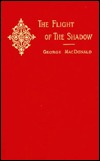- Bíblia
- Leia a Bíblia
- Versões da Bíblia
- Verso do dia
- Planos de Leitura
- Versos por Tópico
- Books of the Bible
- Imagens bíblicas
- Estude
- Comentários
- Concordâncias
- Dicionários
- Enciclopédias
- Sermões
- Bible Atlas & Maps
- BP Wiki
- Devocionais
- Devocionais de hoje
- Light of the World
- Todos os devocionais
- Inspirational Quotes
- Mais
- Picture Quotes
- Videos
- Inspirador
- Estudo da Bíblia
- O que a Bíblia diz
- Bible Q&As
- Daily Bread
- Bible by Genre
- Bible Stories
- Random Bible Verse
- Comunidade
- Store
The Flight of the Shadow
by George MacDonald
"Though it gives the appearance of starting out as a 'realistic' novel in the tradition of his many others, 'The Flight of the Shadow' soon becomes dark and ominous...." (Michael Phillips)
"In [The Flight of the Shadow]... Dr. MacDonald is bound even less than usual by the commonplace of conventional life, and in it are to be found some of the most strikingly imaginative and mystical of his nature pictures, and symbolisms, as where he describes the horizon looking like a 'void between a cataclysm and the moving afresh of the Spirit of God upon the face of the waters.'
"Later... the sight of a rider on a white horse, dimly seen in a storm, awakes the thought of 'Death returning home on the eve of the great dawn, worn with his age-long work, pleased that it was over, and no more need of him.'
"It is with a kind of chastened pity that the flower-like heroine of this book speaks of those who 'are afraid of loneliness, and hate God's lovely dark.'
"These are the same souls who shrink from the idea of death; yet, says Dr. MacDonald, 'no one can be living a true life to whom dying is a terror' [from 'What's Mine's Mine']." (Katherine Weller, 'A Modern Mystic: George MacDonald')
"In [The Flight of the Shadow]... Dr. MacDonald is bound even less than usual by the commonplace of conventional life, and in it are to be found some of the most strikingly imaginative and mystical of his nature pictures, and symbolisms, as where he describes the horizon looking like a 'void between a cataclysm and the moving afresh of the Spirit of God upon the face of the waters.'
"Later... the sight of a rider on a white horse, dimly seen in a storm, awakes the thought of 'Death returning home on the eve of the great dawn, worn with his age-long work, pleased that it was over, and no more need of him.'
"It is with a kind of chastened pity that the flower-like heroine of this book speaks of those who 'are afraid of loneliness, and hate God's lovely dark.'
"These are the same souls who shrink from the idea of death; yet, says Dr. MacDonald, 'no one can be living a true life to whom dying is a terror' [from 'What's Mine's Mine']." (Katherine Weller, 'A Modern Mystic: George MacDonald')
Hardcover, 337 pages
Published October 1st 1994 by Johannesen Printing & Publishing (first published 1891)
Se inscrever
© 2025 Bibleportal.com Todos os direitos reservados.

George MacDonald was a Scottish author, poet, and Christian minister.
Known particularly for his poignant fairy tales and fantasy novels, George MacDonald inspired many authors, such as W. H. Auden, J. R. R. Tolkien, C. S. Lewis, E. Nesbit and Madeleine L'Engle. G. K. Chesterton cited The Princess and the Goblin as a book that had "made a difference to my whole existence."
Even Mark Twain, who initially disliked MacDonald, became friends with him, and there is some evidence that Twain was influenced by MacDonald.
MacDonald grew up influenced by his Congregational Church, with an atmosphere of Calvinism. But MacDonald never felt comfortable with some aspects of Calvinist doctrine; indeed, legend has it that when the doctrine of predestination was first explained to him, he burst into tears (although assured that he was one of the elect). Later novels, such as Robert Falconer and Lilith, show a distaste for the idea that God's electing love is limited to some and denied to others.
... Show more